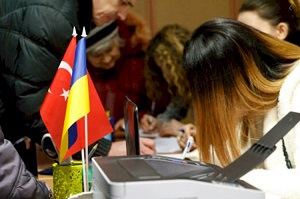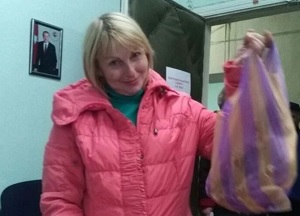Strategic Analysis of U.S., NATO, Europe, and Turkey’s Involvement in the Russia-Ukraine War
Turkey: A Mediator with Its Own Geopolitical Calculations

Strategic Analysis of U.S., NATO, Europe, and Turkey’s Involvement in the Russia-Ukraine War
YUSUF İNAN / ŞEHİTLER ÖLMEZ / TÜRKİYE
Since Russia’s full-scale invasion of Ukraine in February 2022, the global geopolitical landscape has been dramatically altered. The war has not only reshaped the dynamics in Eastern Europe but has also triggered a recalibration of foreign policy and military strategies by key global actors, including the United States, NATO, the European Union, and Turkey. Each of these players has pursued distinct, yet interconnected strategies, with far-reaching implications for regional security, global alliances, and the future of the international order.
United States: A Balancing Act Between Support and Avoiding Escalation
The U.S. has been a central actor in the response to the Russia-Ukraine war. From the early days of the invasion, Washington has taken a clear stance of supporting Ukraine militarily, economically, and diplomatically, while attempting to avoid direct military confrontation with Russia. This has resulted in a finely balanced strategy of deterrence and containment.
-
Military Aid and Financial Assistance: The U.S. has led international efforts in supplying advanced weaponry to Ukraine, including HIMARS rocket systems, drones, and air defense systems. Through the Lend-Lease Act and multiple military aid packages, the U.S. has committed tens of billions of dollars in defense support to Ukraine. This aid is crucial in bolstering Ukraine’s capacity to resist Russian advances, but it also serves as a signal of American commitment to safeguarding democratic norms in Europe.
-
Avoiding Direct Conflict with Russia: While the U.S. provides military support, it has been cautious about actions that could escalate the conflict into a direct U.S.-Russia confrontation. Washington has been clear that it will not deploy American troops to Ukraine or engage in no-fly zones, which could lead to NATO-Russia skirmishes. This is a delicate balancing act—ensuring Ukraine has the means to defend itself without triggering a broader war that could involve nuclear powers.
-
Economic Sanctions: The U.S. has imposed unprecedented sanctions on Russia, targeting its energy sector, key oligarchs, and financial systems. These sanctions aim to cripple the Russian economy, weaken its war machine, and create internal pressure on the Kremlin. The U.S. has also led diplomatic efforts to isolate Russia on the international stage, attempting to reduce Moscow’s influence in global forums like the United Nations.
NATO: Strengthening the Eastern Flank and Reinforcing Unity
NATO’s role in the Russia-Ukraine war is crucial, given the alliance’s historic mission to ensure collective defense against external threats in Europe. The conflict has reaffirmed NATO’s relevance and has led to a significant strengthening of its posture, particularly in Eastern Europe.
-
Reinforcement of NATO’s Eastern Flank: In response to the invasion, NATO has significantly bolstered its presence in Eastern European countries such as Poland, Romania, and the Baltic states. The alliance has deployed additional troops, combat units, and air defenses to its eastern members, reinforcing the security guarantees under Article 5 of the NATO Treaty. These deployments act as a deterrent against potential Russian expansion beyond Ukraine.
-
NATO Expansion: One of the most significant developments in NATO’s strategy is the decision by Sweden and Finland to seek membership, abandoning decades of military non-alignment. Their inclusion in NATO, particularly Finland’s long border with Russia, represents a major shift in the security architecture of Europe, further isolating Russia and expanding NATO’s strategic reach in the Arctic and Baltic regions.
-
Military Coordination and Intelligence Sharing: NATO has been instrumental in coordinating military aid to Ukraine among its members. By sharing intelligence, providing logistical support, and facilitating the movement of weapons, NATO has enhanced Ukraine’s operational capabilities without directly engaging in the conflict. This indirect involvement allows NATO to support Ukraine while avoiding a formal declaration of war against Russia.
Europe: A Struggle Between Unity and Diverging Interests
Europe has found itself on the frontlines of the geopolitical fallout from the Russia-Ukraine war. While the European Union has displayed a remarkable degree of unity in supporting Ukraine, differences in economic dependencies, political leanings, and security concerns have made a unified strategy more complex.
-
Energy Dependency and Economic Sanctions: Europe’s heavy reliance on Russian energy, particularly natural gas, has been a key challenge. The war has forced Europe to drastically reduce its energy imports from Russia, leading to a shift in energy policy. The EU has implemented an aggressive strategy to diversify its energy sources, boost renewables, and secure LNG supplies from the U.S., Qatar, and other producers. The energy crisis has also accelerated Europe’s green transition, with long-term implications for its energy independence.
Simultaneously, Europe has supported comprehensive sanctions against Russia, targeting its financial systems, trade, and key industries. However, some European countries—especially Hungary—have resisted stronger sanctions due to their energy dependence on Russia, creating fissures within the EU.
-
Military and Humanitarian Aid: European countries, led by Germany, France, and the UK, have provided military aid to Ukraine, although the scale and pace have often been slower compared to the U.S. Germany’s initial reluctance to send heavy weapons due to historical sensitivities has been replaced by a more proactive approach, although internal debates persist. European countries have also been at the forefront of providing humanitarian aid, accepting millions of Ukrainian refugees and supporting Ukraine’s post-war reconstruction.
-
Diplomatic Efforts and Internal Divisions: Europe has played a pivotal role in diplomatic efforts to end the conflict, with leaders like French President Emmanuel Macron and German Chancellor Olaf Scholz engaging in talks with both Ukraine and Russia. However, Europe remains divided on how to approach long-term peace. Eastern European countries, particularly Poland and the Baltics, advocate for a tougher stance on Russia, while countries like France and Germany have occasionally signaled the need for diplomacy and potential negotiations with Moscow.
Turkey: A Mediator with Its Own Geopolitical Calculations
Turkey has emerged as a unique player in the Russia-Ukraine war, balancing its roles as a NATO member and a country with deep economic and security ties to both Ukraine and Russia. Ankara has positioned itself as a mediator, offering to host peace talks and brokering key agreements such as the grain deal that allowed Ukrainian exports to resume.
-
Diplomatic Mediation: Turkey’s mediation efforts have been one of its most visible contributions to the conflict. President Recep Tayyip Erdoğan has maintained communication with both Ukrainian President Volodymyr Zelenskiy and Russian President Vladimir Putin, positioning Turkey as a key broker in potential peace negotiations. Turkey successfully mediated the Black Sea Grain Initiative, which facilitated the export of Ukrainian grain despite the ongoing war.
-
Military Aid to Ukraine: Turkey has provided Ukraine with critical military support, most notably through the supply of Bayraktar TB2 drones, which have proven to be highly effective in Ukrainian defense operations. These drones have boosted Ukraine’s capabilities in asymmetric warfare, giving it an edge in targeting Russian forces and logistics.
-
Balancing Russia and the West: Despite its support for Ukraine, Turkey has avoided direct confrontation with Russia. Ankara has refused to join Western sanctions against Russia and has continued to maintain economic ties with Moscow, including energy cooperation. Turkey’s reliance on Russian gas and its complex involvement in the Syrian conflict have influenced its cautious stance. At the same time, Turkey sees the conflict as an opportunity to assert its regional influence and strengthen its leadership role in NATO’s southeastern flank.
Conclusion: The Geopolitical Stakes of the Russia-Ukraine War
The Russia-Ukraine war has not only reshaped the regional dynamics in Eastern Europe but has also tested the strategic alignments of global powers. The U.S. has positioned itself as a key supporter of Ukraine, leading efforts to sanction Russia and provide military aid while avoiding direct conflict. NATO has been revitalized, strengthening its eastern defenses and preparing for long-term security challenges posed by Russia.
Europe, while showing unity in many aspects, remains divided on how to handle its energy dependencies and approach to diplomacy with Russia. Meanwhile, Turkey has played a complex role, balancing its interests with both Ukraine and Russia, while positioning itself as a key mediator in the conflict.
As the war drags on, these strategies will continue to evolve, with the potential to reshape global alliances and redefine the post-war international order. The outcome of this conflict will have long-lasting consequences not only for Ukraine and Russia but for the balance of power in Europe and beyond.
*






































